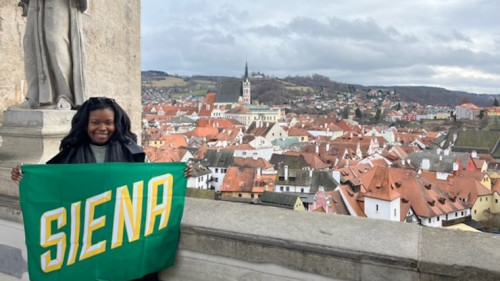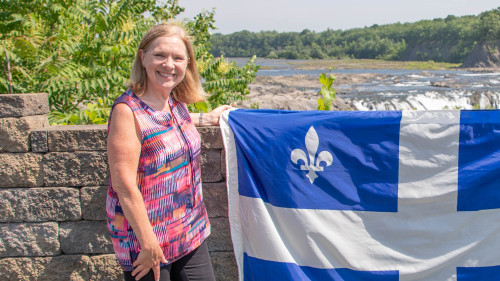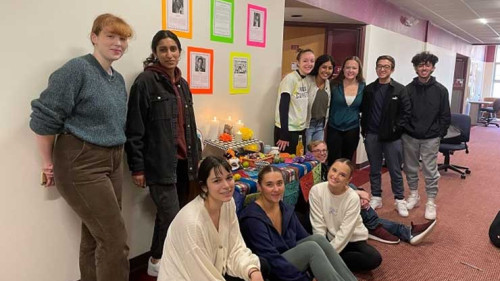
Writing papers is an academic challenge for any college student; imagine writing one in a different language.
That’s a requirement for Siena’s annual Undergraduate Symposium in Modern Languages and Classics, which offers students a space to present their scholarly research related to classics, and/or French, Italian, Spanish and other languages.
Nathalie Degroult, Ph.D., professor of French and chair of the department of modern languages and classics, said the symposium is “an excellent platform where attendees can exchange perspectives, ideas and experiences.”
“The quality of the students’ work was just so breathtaking,” she said. “I’m very glad we have a forum for them to present on campus.”
The fifth annual symposium was held April 8 in The Norm. Students were invited to prepare a three- to four-page research paper or language/culture-related personal narrative that addresses a diverse public. The papers were written in other languages but delivered in English in 10-12 minute presentations.
Degroult explained that writing the papers in one language and then presenting them in English not only made the topics accessible to the entire audience, but gave the student presenters the opportunity to recast their thinking.
“It was excellent training in thinking, speaking and writing the same concepts in different languages,” she said.
Lisette Balabarca, Ph.D., associate professor of Spanish, originally proposed the idea for the symposium back in 2013. She now chairs the annual event.
“When I first proposed the symposium, I visualized it as the Department of Modern Languages and Classics’ signature event,” she said. “It's a space for our students to share their course papers with the Siena community, with the unique element that presentations are related to language and cultural aspects of non-English speaking countries, as well as to classical studies, which is the focus of our department.”
While submitted papers must cover topics related to classics and/or modern languages studies, each year the theme for the symposium is different. This year the focus was on language and identity; heritage, culture and linguistics; and gender roles, social justice and health care systems. Student participants included MLC majors and minors, as well as those who simply have an interest in or connection to another language.
Ifrah Mohammed ’22 presented "Liberty, Equality, Fraternity: why France has failed to live up to its motto,” which highlighted France's hijab ban.
“It's promoted as liberal but is actually oppressive, since hijab is a choice in Islam and French lawmakers (who are mostly men) have taken away that choice from millions of girls and women,” Mohammed said. “As a western/European country, France has influenced other countries to adopt similar policies in the francophone world and beyond like Quebec, Belgium, Switzerland, and even India, leading to hatred and dangerous Islamophobic rhetoric around the world.”
She said Siena’s symposium offers the community the opportunity to learn something new and important outside of the classroom atmosphere.
“These papers weren’t for a grade, but something that all of the presenters were very passionate about!”
Hailey Cowles ’22 shared her findings about the Siena College Research Institute’s data collection and survey processes, with a focus on Spanish-speaking populations.
“All of this research is part the project that I am completing this semester in collaboration with the Research Institute for my Spanish independent study,” she said. “I'm glad there is an event like this in the language department at Siena, because within every different language studied, there is so much information about culture, heritage, and identity to share that goes much deeper than just speaking the language.”
Sofia Bock ‘24 chose to write the personal narrative “Mi Identidad as a امرأة عربية in America,” which focused on being a Muslim woman in America “where there is so much misogyny, racism, and microaggression.”
“I chose this topic in hopes to spread awareness about Islam and the countless misconceptions that are made in regard to the culture and religion,” she explained. “Above all, I hope that sharing my journey of claiming my identity as a Muslim hijabi will inspire the Siena community and people everywhere to learn more about cultures and perspectives other than their own as well as embrace the concept of intersectionality.”

